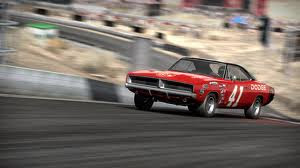 |
| 1969 Dodge Charger Pro Touring-Rear Right View |
1969 Dodge Charger History
That was the distinctive new boots and the Daytona 500, both creatures of the "aero wars" of the day being waged by the Ford and Chrysler as they sought dominance in NASCAR stock-car racing. As it turned out, the recessed grille and flying-buttress inset rear window that looked so great in the 68 Charger was a washout in aerodynamic 190 mph high-banked oval. To create the 1969 Dodge Charger 500, Chrysler engineers began by connecting the nasal cavity of an R / T with a Coronet grille (headlights and nonretracting) rose to the front edge of the body. Meanwhile, they quelled lift for flush mounting in the rear.
Dodge produced 392 of these cars for street use in order to ratify the Charger 500 for racing. Race-prepared 500s went on to claim 19 NASCAR wins, but specially designed Ford Torino and Mercury Cyclones won 30.
Dodge produced 392 of these cars for street use in order to ratify the Charger 500 for racing. Race-prepared 500s went on to claim 19 NASCAR wins, but specially designed Ford Torino and Mercury Cyclones won 30.
 |
| Dodge Charger 1969 Black-Front Left View |
1969 Dodge Charger Modifications
Back to the wind tunnel were the Chrysler engineers, who returned with Daytona radical. This 1969 Dodge Charger used a length of 18 inches pointed to the nose (including pop-up headlights) that cut drag and downforce added. Not only the Daytona 500 is to keep the rear window, but still lower lift mounting a horizontal tail stabilizer on huge vertical extensions that rose from the deck. With 503 produced to meet the rulesmakers races, the Daytona track made its debut in the final season of NASCAR 69 - a little too late for Ford to return to the attack. Still, the Daytona proved capable of 200-mph running speeds.
Back to the wind tunnel were the Chrysler engineers, who returned with Daytona radical. This 1969 Dodge Charger used a length of 18 inches pointed to the nose (including pop-up headlights) that cut drag and downforce added. Not only the Daytona 500 is to keep the rear window, but still lower lift mounting a horizontal tail stabilizer on huge vertical extensions that rose from the deck. With 503 produced to meet the rulesmakers races, the Daytona track made its debut in the final season of NASCAR 69 - a little too late for Ford to return to the attack. Still, the Daytona proved capable of 200-mph running speeds.
 |
| Hpi-1969 Dodge Charger Offroad Model |
Issues of competition and all of the Daytona 500 came with 426-cid race Hemis. Those intended for retail customers could be purchased with the trainer or the Street Hemi 375 horsepower 440-cid V-8 Magnum. Anyway, they were the final words of the 1969 Dodge Charger.
 |
| Dodge Charger 1969 Red-Rear Left View |
1969 Dodge Charger Specifications
- Fuel system: 2 x 4 bbl.
- Compression ratio: 10.25:1
- Horsepower @ rpm: 425 @ 5000
- @ Rpm Torque: 490 @ 4000
- 1969 Dodge Charger 500 Hemi
- Wheelbase: 117.0 in.
- Weight: 3,671 pounds
- Price: $ 4641Engine: OHV V-8
- Displacement: 426 cid
- Performance Representative
- 0-60 mph: 5.7 sec.
- 1 / 4 mile: 13.48 Mon @ 109.0 mph
 |
| 1969 Dodge Charger RT-On Racing |
Tidak ada komentar:
Posting Komentar